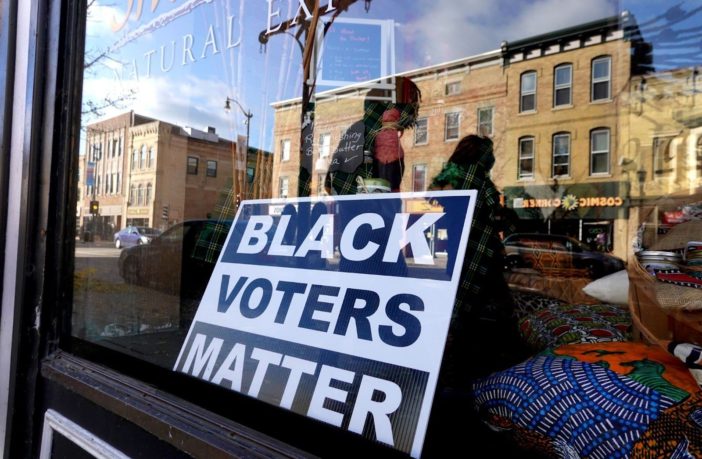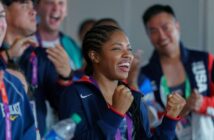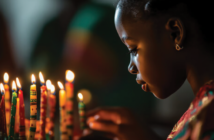It’s Presidential election season again, and we can expect some type of spectacle in politics every four years. A recent revelation surrounding AI-generated images depicting former President Donald Trump surrounded by smiling Black individuals has sparked concerns over the potential misuse of this technology in political campaigns, specifically in attempts to sway the Black vote. These fabricated images were uncovered in a BBC investigation; as Trump strategically aims to court Black voters, the deployment of lifelike images created by AI raises alarming questions about the ethical implications of using manipulated visuals to manipulate public perception.
This revelation is not merely an isolated incident but rather a glimpse into the future landscape of political campaigning. The absence of regulations around AI-generated content leaves the door open for political campaigns to exploit this technology, jeopardizing the integrity of our democratic processes. The erosion of trust in online visuals can have far-reaching consequences, affecting political landscapes and public perception of reality. We need to start investing in digital literacy and critical thinking skills as we progress further into the advancement of technology.
Did the Oscars improve on its diversity?
Da’Vine Joy Randolph, winner of the Actress in a Supporting Role award for ‘The Holdovers’ poses in the press room during the 96th Annual Academy Awards. Photo by Rodin Eckenroth/Getty Images
It’s been almost a decade since campaign finance lawyer April Reign created the hashtag #Oscarssowhite went viral over the Academy’s lack of diversity in its award categories. This year, at least from my point of view, there has been some progress. The Academy made some big promises in 2020 to double the number of female members and triple their members of color. That’s all good, but honestly, I felt the gatekeepers were just doing enough to meet their racial and gender quotas.
Five Black actors were nominated for an Oscar for the first time this year. Da’Vine Joy Randolph won Best Supporting Actor in The Holdovers. And if you noticed, we’ve seen talents like Angela Bassett, Lil Gladstone, Whoopi Goldberg, Cicely Tyson, Angela Bassett, Cynthia Erivo, and others who have been nominated for Best Actor in a Leading Role but fell short.
And it’s not like Black folk don’t come out and support films. We spend millions yearly, but we are still fighting to be valued on the small and big screens. We truly need to stop lamenting these gatekeepers’ actions every year and try to uplift other award ceremonies that care about the talent in our communities. It’s a tall question because who wouldn’t want to win the Oscars? But with the cards stacked against you, what should we do to improve the situation?
#KeepTikTok: A Battle Cry for Creativity and Community
 Congress is moving forward with legislation to force China’s ByteDance to divest from TikTok or else the popular video-sharing platform will be banned from app stores in the U.S. Photo by Gonzalo Marroquin/Getty Images for TikTok
Congress is moving forward with legislation to force China’s ByteDance to divest from TikTok or else the popular video-sharing platform will be banned from app stores in the U.S. Photo by Gonzalo Marroquin/Getty Images for TikTok
TikTok has become a global phenomenon, connecting people from diverse backgrounds and fostering creativity. Now, the very essence of this vibrant platform is under threat, and thousands of users are rallying to #KeepTikTok in response to potential bans fueled by legislative actions.
With over a billion monthly active users, TikTok has not only given rise to influencers but has become a livelihood for many. The recent legislative bill, the “Protecting Americans from Foreign Adversary Controlled Applications Act,” could force TikTok’s parent company, ByteDance, to divest or face a ban from U.S. app stores. The proposed legislation, if enacted, would empower the president to designate certain social media apps as national security threats, potentially leading to their ban from online app stores.
This impending threat has prompted a resurgence of the #KeepTikTok hashtag, with users passionately sharing stories of the positive impact TikTok has had on their lives. TikTok has become a platform where individuals, both influencers and everyday users, have found a voice, an audience, and a community. Whether launching successful career businesses or fostering global connections, TikTok has become a cultural phenomenon transcending borders.
At one point, we lived in a world without relying heavily on social media. After it’s a rented space, it can go away in the blink of an eye. Focus on actually building your website or host platform where you can keep your work. Also, it makes sense to question if the government is looking out for the nation’s best interests or finding another way to control how people speak and make money on the app.



